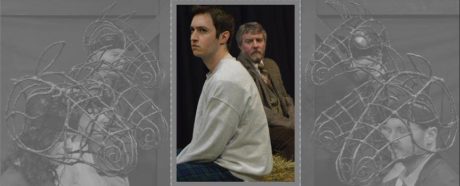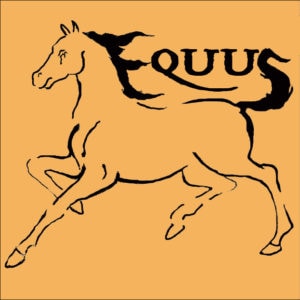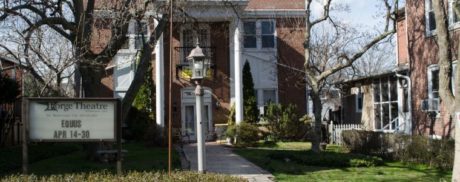Theatergoers of the 1970s will remember Peter Shaffer’s Equus as the ultimate phantasmagorical theater ride. The revolving stage, the omnipresent stage smoke, the blasting music, and the eight-foot-tall dancing horses were all used to thrust us inside the mind of a troubled young stable boy who had blinded six beautiful horses.

The production at The Forge Theatre, directed and designed by Suki, is quite a different affair. Stripped of all spectacle and set in a stable, it is a quiet detective story. A psychiatrist interviews the boy and other people in his life, trying to discover the heart and motive of this horrific deed. Brooding over the proceedings are the horses. Anyone who has stood near these magnificent animals cannot help but be impressed, as our ancestors in ancient Greece were, with their elegance, size, energy, and strength.
The psychiatrist, Dysart, played here by Eric Jarrell, begins by interviewing the boy, Alan, played by Matt Ronzani. He finds the lad totally uncooperative and taken to reciting jingles from commercials. He journeys to meet the parents (the always-excellent Teri Maxwell and Lenny Grossman), who demonstrate a conflicted upbringing for the boy, overshadowed by religion and sexual repression. The doctor then visits the stable where the crime took place and meets the owner (Murray Kramer), who tries to help, as well as Jill (Tiffany Moskow), a teenage girl who demonstrates a thorough knowledge of horses, not to mention a sexual forwardness that will later unsettle Alan. Assisting Dysart are Denise McBride as a nurse, and Laura Cohn as the invaluable colleague that most psychiatrists wish they could confide in but never seem to have.
The horses (Christopher Ritsick, Anne Lannak, Stefanie Nicolosi, Patrick McGurk, and Kat Wylde) have impressive costumes (courtesy of Danielle Riedel, with majestic horse heads created by Burton Merriam). These actors are wonderful athletes, but since they lack the distinctive stilt-like footwear seen in some other productions, they never tower over the actors the way real horses do; this also deprives them of the frightening sound of hooves. The low-key lighting is by Clem Mirto.

Jarrell is effective as a psychiatric interviewer. He listens patiently and prods gently to discover the young man’s secrets. Shaffer certainly creates a challenge (as he does in Amadeus) by tossing in pages and pages of highly poetic language, as the poor doctor struggles with his own demons. Here’s a sample:
“I watch that woman knitting, night after night – a woman I haven’t kissed in six years – and he stands in the dark for an hour sucking the sweat of his God’s hairy cheek! Then in the morning, I put away my books on the cultural shelf, close up the Kodachrome snaps of Mount Olympus, touch my reproduction statue of Dionysus for luck – and go off to hospital to treat him for insanity.”
Directors usually treat this puzzle by slathering the play with juicy theatricality, and casting an actor experienced with classical theater language. Suki’s more realistic version makes Shaffer’s work seem overlong and overwritten. This production also exposes the truth that psychiatry has moved forward since the 1970s, and thus Shaffer’s handling of patient treatment is terribly out of date. Its approach is comparable to the one in the ’60s film King of Hearts, about the soldier who leaves the war to live in a madhouse because it makes more sense than the real world. These themes now seem a bit twee and fanciful in our modern age.
Playing Alan, the talented Ronzani scores as a sullen, withdrawn teenager with a laughing lack of respect for authority. But his portrait of a young man battling demons, repression, and possibly full-blown psychosis needs the “forceful” rapture of life that Dysart, and the audience, find so compelling, and that eventually makes Dysart doubt his healing powers.
This is a highly unusual play for a community theater to attempt. The directors of the Forge are to be congratulated for this foray into challenging adult themes. Hopefully, other challenging plays like this will soon appear on local rosters.
Running Time: 2 hours and 30 minutes, with an intermission.

Equus plays through Sunday, April 30, 2017 at the Forge Theater – 241 First Avenue, Phoenixville, PA. For tickets call the box office at 610-935-1920 or purchase them online.




